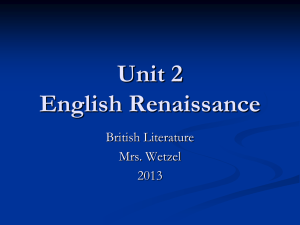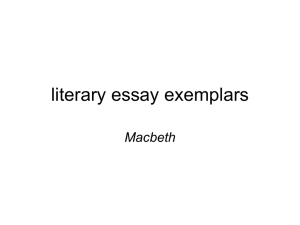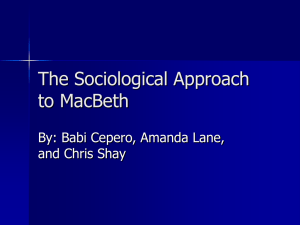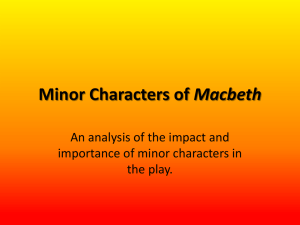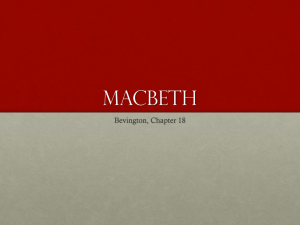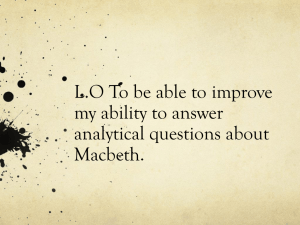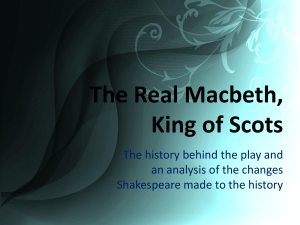The Influence of king james in Shakespeare*s macbeth
advertisement
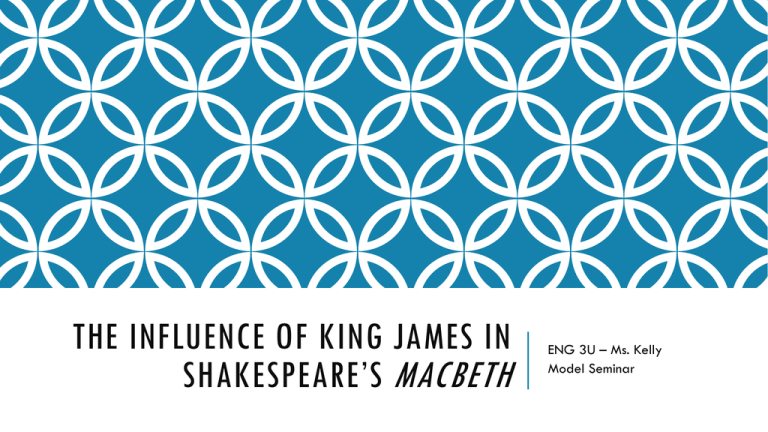
THE INFLUENCE OF KING JAMES IN SHAKESPEARE’S MACBETH ENG 3U – Ms. Kelly Model Seminar KING JAMES I (OF ENGLAND) AND VI (OF SCOTLAND) Learning Goal: Students will understanding the importance of King James’ influence on Shakespeare’s writing of Macbeth. BACKGROUND INFORMATION - MACBETH Macbeth is not a “history” play Macbeth was a Scottish figure who ruled from 1040 to 1057 Though the numerous accounts of this time period vary, it is agreed by all sources that Macbeth did come to power by killing King Duncan, and lost his power when killed by Malcolm Shakespeare drew heavily from Raphael Holinshed’s Chronicles of England, Scotland and Ireland Major alterations to the dramatics of the play center around the theme of kingship Macbeth was written and first performed in 1606 Coles Notes. Macbeth: Total Study Edition. Mississauga: John Wiley & Sons Canada, Ltd., 2012. Print. BACKGROUND INFORMATION – KING JAMES King James VI ruled in Scotland from 1567 to 1603, when Queen Elizabeth 1 named him King of England (King James I) on her death bed; having no male sons of her own to inherit the throne King James and Queen Elizabeth were relatives of each other James was a direct descendant of Banquo James believed in the Divine Right of Kings, which was adopted in Scotland in the 11th century James was incredibly religious, having published the King James version of the Bible in 1611 James was a renowned scholar having written many books including Daemonolgie (1597) Under James, the arts and sciences of England flourished "James I of England." - New World Encyclopedia. N.p., 3 Apr. 2008. Web. 16 Apr. 2014. <http://www.newworldencyclopedia.org/entry/James_I_of_England>. Web. ABSOLUTE POWER Given that Kings were viewed as God’s emissaries, they received absolute power While James was known as a lover of the arts, he was also known for some evil deeds as well: 1596 - Ulster, Ireland 1000s of Catholics starve in exile after James I seizes Ulster from Roman Church and gives it to Scottish and English Protestants. 1597 - King James I of England publishes Daemonologie which becomes official handbook of Scottish witchfinders 1597 - 23 women and one man are burned at Aberdeen in one of Scotland's most notorious witchcraft trials; accused are mainly elderly women. 1597 - English conjurer and herbalist Edmund Hartley is hanged after court convicts him of causing two children of Leigh, Lancashire, to become "possessed". 1605 – Conspirators in the Gunpowder Plot were tortured on the rack until they confessed, and then killed in a brutal fashion to serve as warning to any future traitors/conspirators "Influential People." One Evil: King James I of England. OneEvil.org, n.d. Web. 16 Apr. 2014. <http://one-evil.org/content/people_17c_james_i.html>. Web. "Macbeth: Background." BBC News. BBC, 1 Jan. 2014. Web. 16 Apr. 2014. <http://www.bbc.co.uk/bitesize/higher/english/macbeth/background/revision/1/>. Web. THESIS Although he was already an accomplished writer at the time of King James’ coronation, the prospect of increased wealth and security under the King’s patronage influenced Shakespeare to alter his adaptation of Macbeth from the Holinshed Chronicles in favour of, and with consistent references to, King James. PROOF 1. Biblical References 2. The Gunpowder Plot 3. Witches 4. Banquo BIBLICAL REFERENCES Macbeth: I. iv. Duncan: I have begun to plant thee, and will labour To make thee full of growing. Noble Banquo, That hast no less deserved, nor must be known No less to have done so, let me enfold thee And hold thee to my heart. Commentary King James’ adoration of his religion culminated in the King James version of the Bible, published in 1611. While biblical references are used in all of Shakespeare’s plays there are more than sixty biblical references in Macbeth. In this quote, Shakespeare demonstrates Duncan’s divine right to the throne, which further asserts King James’ proper and divine right to the throne. THE GUNPOWDER PLOT Macbeth: I.v. & II.iii. Lady Macbeth: …look like the innocent flower, But be the serpent under’t… ____________________________________________ Porter: …Faith, here’s an equivocator, that could swear in both the scales against either scale; who committed treason enough for God’s sake, yet could not equivocate to heaven. O, come in, equivocator. (3.2.9-12). Commentary In 1605, a conspiracy was hatched by a group of Catholics, angry at King James. They intended to blow up James and his parliament. Shakespeare’s connection to the plot was only familial in nature, but enough of a connection that he would have been concerned for his safety and monetary security. It is of no coincidence that within a year Shakespeare is writing and producing Macbeth, with direct (negative) references to the Plot and its conspirators. WITCHES Macbeth: I.iii. Third Witch: Sister, where thou? First Witch: A sailor’s wife had chestnuts in her lap, And munch’d, and munch’d, and munch’d: Give me quoth I: ‘Aroint thee, witch!’ the rump-fed ronyon cries. Her husband’s to Aleppo gone, master o’ the Tiger: But in a sieve I’ll thither sail, And, like a rat without a tail, I’ll do, I’ll do, and I’ll do. Second Witch: I’ll give the a wind… First Witch: I myself have all the other; And the very ports they blow, All the quarters that they know I’ the shipman’s card I’ll drain him dry as hay: Sleep shall neither night nor day Commentary Shakespeare’s depiction of witches was evil in nature. Holinshed’s depiction differed in the sense that “goddesses” assisted Macbeth. This dramatic change from good to evil by Shakespeare is directly related to King James. James was incredibly interested in the supernatural; witches in particular. In 1597 he published Daemonolgie, in which he vilified witches and their powers. This vilification is carried forward in Shakespeare’s Macbeth. As a patron of King James, Shakespeare would not be wise to portray those who help Macbeth as “good.” BANQUO Macbeth: II.i. Macbeth: If you shall cleave to my consent, When ‘tis, it shall make honour for you. Banquo: So I lose none In seeking to augment it, but still keep My bosom franchised and allegiance clear… Commentary Banquo is consistently portrayed in a sympathetic light within the play. In Holinshed’s account of Macbeth, Banquo assisted in the killing of Duncan. In Macbeth, Shakespeare portrays Banquo has loyal to the King, despite the consequences. Given the hereditary line between Banquo and King James, Shakespeare knew it would not be wise to portray Banquo as an accomplice to the removal of a King who has divine rights, like James. WORKS CITED Coles Notes. Macbeth: Total Study Edition. Mississauga: John Wiley & Sons Canada, Ltd., 2012. Print "Influential People." One Evil: King James I of England. OneEvil.org, n.d. Web. 16 Apr. 2014. <http://one-evil.org/content/people_17c_james_i.html>. Web. "James I of England." - New World Encyclopedia. N.p., 3 Apr. 2008. Web. 16 Apr. 2014. <http://www.newworldencyclopedia.org/entry/James_I_of_England>. Mabillard, Amanda. "Shakespeare and the Gunpowder Plot." Shakespeare and the Gunpowder Plot. N.p., 19 Nov. 2011. Web. 16 Apr. 2014. <http://www.shakespeareonline.com/biography/gunpowderplot.html>. Web. "Macbeth: Background." BBC News. BBC, 1 Jan. 2014. Web. 16 Apr. 2014. <http://www.bbc.co.uk/bitesize/higher/english/macbeth/background/revision/1/>. Web. Shakespeare, William. Macbeth. Canada: ITP Nelson Canada, 1997. Print.
